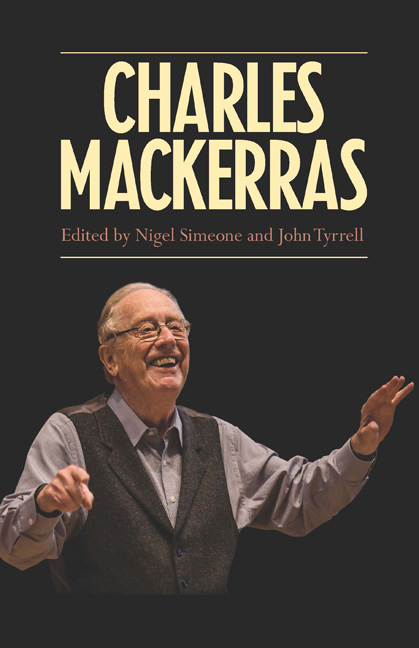Book contents
- Frontmatter
- Dedication
- Contents
- List of Illustrations
- List of Abbreviations
- Preface and Acknowledgments
- About the Contributors
- Charles Mackerras: A Chronology
- Prologue: A Eulogy for Charles
- 1 An Immense Stylist Evolves: 1947–87
- 2 A Personal Portrait of Charles Mackerras
- 3 Mackerras and Janáček
- 4 Goat's Milk in Vienna: Three Memorable Meetings
- 5 The Lion: Charles Mackerras
- 6 ‘The Musical Values of Opera’: WNO, 1987–92
- 7 Triumphs and Tribulations: Opera, 1993–2001
- 8 Rethinking Old Favourites: Opera, 2002–10
- 9 The Last Great ‘Czech’ Conductor
- 10 Reminiscences of a Friend and Colleague
- 11 Reconstructing a Better Version of The Greek Passion
- 12 Reconstructing Sullivan's Cello Concerto
- 13 Three Orchestras
- 14 Coda
- Appendix 1 Mackerras in Performance
- Appendix 2 Desert Island Lists
- Discography
- Bibliography
- Editions and Arrangements by Charles Mackerras
- Index
7 - Triumphs and Tribulations: Opera, 1993–2001
Published online by Cambridge University Press: 05 May 2015
- Frontmatter
- Dedication
- Contents
- List of Illustrations
- List of Abbreviations
- Preface and Acknowledgments
- About the Contributors
- Charles Mackerras: A Chronology
- Prologue: A Eulogy for Charles
- 1 An Immense Stylist Evolves: 1947–87
- 2 A Personal Portrait of Charles Mackerras
- 3 Mackerras and Janáček
- 4 Goat's Milk in Vienna: Three Memorable Meetings
- 5 The Lion: Charles Mackerras
- 6 ‘The Musical Values of Opera’: WNO, 1987–92
- 7 Triumphs and Tribulations: Opera, 1993–2001
- 8 Rethinking Old Favourites: Opera, 2002–10
- 9 The Last Great ‘Czech’ Conductor
- 10 Reminiscences of a Friend and Colleague
- 11 Reconstructing a Better Version of The Greek Passion
- 12 Reconstructing Sullivan's Cello Concerto
- 13 Three Orchestras
- 14 Coda
- Appendix 1 Mackerras in Performance
- Appendix 2 Desert Island Lists
- Discography
- Bibliography
- Editions and Arrangements by Charles Mackerras
- Index
Summary
In the autumn of 1969 the Sadler's Wells Opera Company was on tour at the Empire Theatre, Liverpool. On arrival I took the lift up to the company's office to check in. A man with freckly eyes and red wavy hair slipped into the lift as the gate was closing. He looked me up and down. ‘Who are you?’ he asked. ‘Cheeky chap,’ I thought, summoning up all the hauteur of a junior principal who had joined the company only a year earlier, straight out of the Geneva Conservatoire, and was earning no less than £30 a week. ‘I'm Anne Evans,’ I said, ‘and I'm singing Pamina tonight in The Magic Flute. Who are you?’ ‘I'm Charlie Mackerras,’ he replied. ‘I'm conducting it.’ Collapse of junior principal. Charles Mackerras was the company's new music director and this was our first encounter.
After the Flute performance there was a party for the company at Liverpool's Bluecoat Chambers that was notable for the amount of alcohol consumed and the endless joke-telling. Charles always loved good jokes. Eventually my friend, the mezzo-soprano Katherine Pring, and I deposited him outside the Adelphi Hotel, where he was staying. I can see him now, tottering up the steps and disappearing into the foyer. Such was the start of a professional relationship that was to last thirty-six years.
I did some more Paminas with Charles and it soon became apparent that he could be ruthless in demanding the highest standards and that he was very ambitious for the company. Fun and frivolity were fine outside the rehearsal room, but his approach to work was deadly serious. He was determined that by the time the Flute reached the Coliseum the chorus members who had been singing the Three Ladies and the Three Boys would be replaced by young principals. Further, he told a Queen of the Night who was transposing one of her arias down that if she did not sing it in the higher key at the next performance she would be out. She managed to do so and she stayed.
- Type
- Chapter
- Information
- Charles Mackerras , pp. 107 - 125Publisher: Boydell & BrewerPrint publication year: 2015



